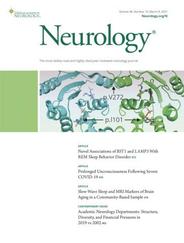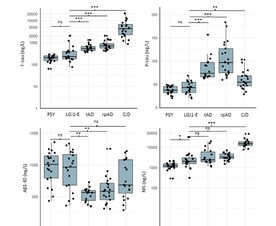Core cerebrospinal fluid biomarker profile...
Patients with encephalitis associated with antibodies against Leucine-rich Glioma-Inactivated 1 (LGI1) frequently exhibit persistent cognitive impairments, evoking neurodegenerative processes. Whether these dementia-like features are a consequence of a neuronal damage or a functional synaptic disturbance is unclear. In the few neuropathological cases available, no massive neuronal loss was observed. However, longitudinal Magnetic Resonance Imaging (MRI) studies have shown that persistent cognitive deficits in some LGI1 encephalitis patients was accompanied by a pronounced hippocampal atrophy and an alteration of the hippocampal connectivity [1]. These imaging studies support a link between impaired cognitive functions and neuronal and axonal damages in LGI1 encephalitis.
Patients with LGI1 encephalitis were retrospectively selected from the French Reference Centre database between 2010 and 2019 and enrolled if CSF was available for biomarkers analysis including total tau (T-tau), phosphorylated tau (P-tau), amyloid-beta Aβ1-42, and neurofilaments light chains (Nf L). Samples sent for biomarker determination as part of routine practice, and formally diagnosed as AD, CJD, and PSY, were used as comparators.




